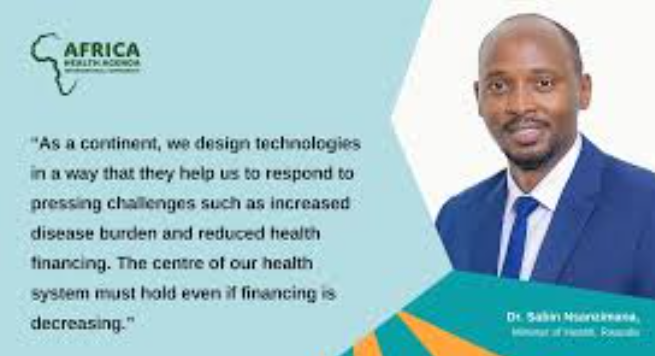By Daniel Niyongabo
Kigali, Rwanda – Rwanda’s Ministry of Health has unveiled the “Rwanda Health Intelligence Centre,” a state-of-the-art facility designed to transform healthcare delivery through real-time data monitoring, advanced analytics, and artificial intelligence. Launched on Thursday, April 2nd, the center aims to consolidate data from various health facilities and communities, allowing for informed policy decisions and improved patient outcomes.
Located in Kiyovu, within the RURA building, the center is staffed by a multidisciplinary team, including medical doctors, data scientists, software developers, and programmers. Its capabilities range from tracking the usage of vital public health equipment, such as ambulances and hospital refrigerators, to analyzing the effectiveness of medical procedures performed in hospitals.
“We aim to bring all this information together for analysis to improve the functioning of health systems,” explained Muzungu Hirwa, a data scientist and medical doctor at the institution. The center boasts several departments, including a data warehouse that stores and monitors patient care information, routine reports from health facilities and community health workers, and community feedback gathered from sources like social media.
A key feature of the center is its control room, dedicated to data visualization and analysis. There’s also a dedicated space for programmers focused on data integration, and a section focused on telemedicine to expand healthcare access. The center even monitors hospital leadership and assesses service delivery relating to performance contracts (“Imihigo”) using technology.
Real-Time Monitoring for Enhanced Efficiency
The Center’s advanced technology allows for real-time monitoring of critical equipment. For example, sensors installed on hospital refrigerators send data directly to the center, allowing officials to monitor their functionality and ensure proper usage. Similarly, ambulances are tracked, providing information on their precise location and speed.
Leveraging AI and Machine Learning for Predictive Healthcare
Beyond simply monitoring, the center aims to predict future health outcomes through the application of machine learning and artificial intelligence. Muhammad Semakula, Head of Department for Planning, Monitoring, Evaluation and Health Financing at the Ministry of Health, emphasizes that the data will be used not only for making decisions but also for predicting future outcomes.
One of the center’s primary functions is in-depth analysis of health outcomes. For instance, in maternal healthcare, scientists can investigate the root causes of maternal deaths, analyzing the circumstances and conditions under which they occur to identify solutions. This data can then be fed into machine learning models that can predict potential future outcomes and alert medical professionals to high-risk cases.
“For example, with this technology, the system can inform the doctors that a particular woman visiting the facility is at high risk for pregnancy complications or adverse outcomes,” Hirwa noted.
The centre also tracks financial data, offering insights into hospital spending and resource allocation.
Empowering Community Health Workers
Significantly, the data collected and analyzed by the center will include information provided by Rwanda’s approximately 58,000 Community Health Workers (CHWs), who serve as a crucial link to healthcare in local communities. These CHWs input data on their smartphones, providing valuable insights into grassroots healthcare needs and trends.
A Shift Towards Data-Driven Decision Making
Dr. Sabin Nsanzimana, the Minister of Health, praised the system for enabling instant data-driven decision-making, eliminating the need for lengthy meetings and procedures.
The initiative aligns with the World Health Organization (WHO)’s emphasis on the importance of regular and reliable health data for ensuring the availability and quality of health services.
Investing in Healthcare Digitization
Rwanda is part of a group of low and middle-income countries highlighted as needing significant investment in healthcare digitization. A costing study hinted at during the Mobile World Congress (MWC) in Kigali in 2023 estimated the need for up to $4.1 billion to achieve this goal.
The launch of the Health Intelligence Centre marks a significant step in Rwanda’s ongoing efforts to digitize its healthcare system. These efforts include the development of “e-Ubuzima,” a digital platform designed to consolidate healthcare services and allow patients to access their medical records online. This application aims to significantly reduce patient wait times and streamline healthcare access. The Ministry of Health announced in January that e-Ubuzima is slated for public launch within the next three months.









